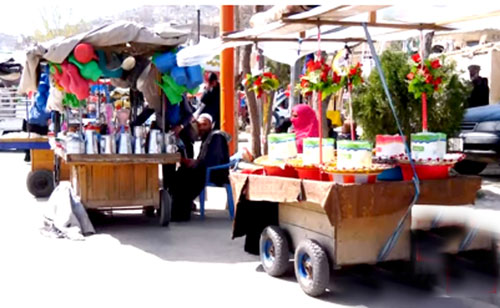Due to the economic challenges, a woman works as a vendor on the streets of Kabul, and was interviewed by TOLOnews.
She said that she has to work on the streets of the national capital from morning until night to find a piece of bread for her family.
“I come here at seven o’clock and I take out my cart and clean it, I go far away on my way to work,” said Rahela.
Rahela said that she lost her husband fourteen years ago and now she lives with her daughter in a rented house in Kabul.
“It is usual. If someone comes and I sell one or two things…if not, there is even a day when I sell nothing, I borrow money to go home,” said Rahela.
Meanwhile, the Ministry of Economy says it has taken steps to address the country’s economic challenges in the country.
“Our plan is to create job opportunities … and reduce poverty, support small industries, strengthen the private sector and attract foreign investment,” said Abdul Latif Nazari, deputy Minister of Economy.
“The government must create different programs for them, the most basic of which is to create job opportunities, because creating suitable and sustainable jobs can be the solution to eradicating poverty,” said Muzmal Shinwari, an economist.
Previously, the World Labor Organization said in a report that nearly one million people would be out of work in Afghanistan by the middle of this year.
“When I was in Kabul, and when my colleagues were there, we all told the Taliban the same message. If you want your resources to be unfrozen, if you want the country to enjoy again substantive development support by the international community, you also have to make steps in their direction. It’s–it goes both ways, but it is a dialogue. It cannot be a wall-to-wall situation, said Grandi.
The commissioner, in response to the question over whether this Taliban government is the same Taliban that ruled Afghanistan very severely in the 1990s, said: “The Afghanistan, the Taliban … in 1996, 1997 was profoundly different from the Afghanistan that they have taken over recently. And they have to live with that, they have to cope with that, they have to deal with that situation.”
The Islamic Emirate said it has taken steps to positively engage with the world.
“We have traveled to many counties on behalf of Afghanistan, raised our voices, participated in sessions and we were welcomed and this is good engagement for official recognition of the Islamic Emirate,” said Amir Khan Muttaqi, acting Foreign Minister.
“The remaining problems have to be resolved diplomatically and through logical negotiations. The Islamic Emirate of Afghanistan is ready to negotiate over some issues to remove some concerns,” said Inamullah Samangani.
The UN commissioner for refugees further said that Afghan women and girls must be allowed to attend schools, and minorities must be represented.
After the victory of the Islamic Emirate in Afghanistan, many Afghans who were working for state and international offices and some private agencies lost their jobs and the poverty rate has increased dramatically in Afghanistan.—Tolonews










